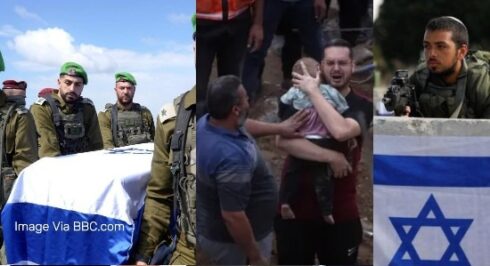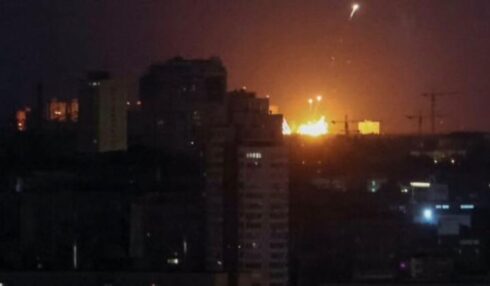On February 20, 2025, Hamas returned the bodies of four Israeli hostages to Israel as part of a ceasefire agreement. The deceased were identified as Shiri Bibas, her two young sons, Ariel and Kfir, and 84-year-old Oded Lifshitz. The Bibas family was abducted during Hamas’ attack on Israel on October 7, 2023, an incident that marked the beginning of heightened hostilities between the two sides.
Hamas claimed that the hostages were killed in Israeli airstrikes targeting Gaza, a statement that has sparked outrage and controversy. Israeli authorities had previously voiced concerns over the hostages’ safety, but the confirmation of their deaths has led to national mourning. The remains were transferred to Israel through the International Committee of the Red Cross, an organization that has played a crucial role in mediating humanitarian exchanges.
Hamas is not innocent. The group is designated as a terrorist organization by multiple countries, including the United States, the European Union, Canada, and Israel. Hamas has a long history of carrying out attacks on civilians, including suicide bombings, indiscriminate rocket fire, and hostage-taking. While Hamas often portrays itself as a resistance movement, its deliberate targeting of civilians has drawn international condemnation and accusations of war crimes. The return of the hostages’ bodies, under the supervision of the International Committee of the Red Cross, has reignited debates about Hamas’ tactics and Israel’s military response.
Israeli Government Expresses Regret Over Failed Rescue Efforts
Following the return of the bodies by Hamas, Israeli President Isaac Herzog issued a formal apology to the victims’ families, acknowledging the state’s failure to protect and rescue them. The emotional statement underscored the gravity of the situation, with Herzog emphasizing the ongoing efforts to secure the release of all hostages still in captivity.
The tragic deaths have further intensified scrutiny over Israel’s military strategies, particularly in densely populated conflict zones. While Israeli officials have denied targeting civilians or hostages, the incident has raised critical questions about the unintended consequences of their military actions. The exchange is part of a broader deal that also includes the release of six living Israeli hostages and hundreds of Palestinian prisoners, signaling potential diplomatic progress despite the ongoing conflict.
Hamas’ Role in Civilian Casualties During Conflict
While Hamas claims that the hostages died in Israeli airstrikes, it is important to recognize that Hamas frequently places civilians—and even its own hostages—in harm’s way. The group has been widely accused of using human shields, deliberately launching attacks from civilian areas, and storing weapons in schools and hospitals. These tactics not only increase civilian casualties but also complicate Israel’s military response.
Past incidents further illustrate Hamas’ disregard for civilian life. The group’s strategy of embedding within urban areas contributed to the deaths of 106 civilians in April 2024 when an Israeli airstrike targeted a Hamas command center in Gaza. Similarly, Hamas’ presence within the densely populated Jabalia refugee camp led to over 120 casualties when Israeli forces struck the area in October 2023. In both cases, Hamas bore significant responsibility for the deaths by operating within civilian environments.
Israeli Airstrikes for Civilian Casualties
As Israel continues its military campaign, it has reaffirmed its commitment to eliminating Hamas while minimizing harm to civilians. The IDF employs various measures, such as issuing evacuation warnings and precision strikes, but the challenge remains enormous due to Hamas’ tactics.
Hamas, on the other hand, continues to operate with impunity in Gaza, enforcing its rule through intimidation and violence. Its refusal to release all hostages, including women and children, underscores its disregard for humanitarian principles. While international bodies call for accountability from Israel, there is an urgent need for greater scrutiny of Hamas’ war crimes and its role in prolonging the suffering of both Israelis and Palestinians.
The deaths of the Bibas family and Lifshitz are not isolated incidents, as multiple Israeli military operations have led to significant civilian casualties in recent months. In April 2024, an Israeli airstrike on an apartment building in Gaza City killed 106 civilians, an attack that Human Rights Watch later described as an “apparent war crime.” The organization emphasized the unlawful nature of targeting civilian areas without military necessity.
Similarly, in December 2024, Amnesty International reported that Israeli airstrikes in Lebanon killed at least 49 civilians, including entire families. The report alleged that these strikes lacked clear military objectives, making them potential violations of international law. A particularly devastating attack occurred on October 31, 2023, when Israeli forces bombed the Jabalia refugee camp in Gaza, killing over 120 people, mostly women and children. The incident triggered global condemnation, with international organizations labeling it a massacre.
Concerns Over Treatment of Palestinian Prisoners
Apart from airstrike-related casualties, concerns over the treatment of Palestinian detainees have also surfaced. In February 2025, five Israeli reservist soldiers were indicted for the severe assault of a Palestinian detainee at the Sde Teiman detention facility. Reports indicate that the detainee suffered cracked ribs and a punctured lung due to the mistreatment.
The indictment has fueled discussions about the Israeli military’s conduct, particularly regarding detainee treatment. Human rights organizations have repeatedly called for independent investigations into the conditions within Israeli detention centers, citing concerns over potential violations of international humanitarian law. Critics argue that the reported abuse points to a broader pattern of mistreatment and underscores the need for accountability measures.
International Scrutiny of Both Hamas and Israeli Military Actions
Despite Hamas’ clear role in endangering civilians, Israeli military operations have faced scrutiny from international organizations. In December 2024, Amnesty International reported that Israeli airstrikes in Lebanon killed at least 49 civilians. The organization called for an investigation, but Israel maintains that such operations targeted Hezbollah-linked financial networks aiding terrorist activities.
At the same time, human rights groups have pointed out Hamas’ continued violations of international law. Reports have documented Hamas’ execution of Palestinian dissidents, its recruitment of child soldiers, and its diversion of humanitarian aid for military purposes. These acts further demonstrate that Hamas is not simply a resistance group but an organization engaged in systematic terror and repression.
Israeli authorities have also contended that many civilian casualties result from adversaries using civilians as human shields. Regarding operations in Lebanon, Israel has been accused of unlawfully targeting civilian infrastructure, including financial institutions linked to Hezbollah. However, Israeli officials maintain that such sites are legitimate military targets due to their affiliations with armed groups.
As global pressure mounts, human rights organizations continue to call for independent investigations into Israel’s military actions. The latest developments underscore the need for greater accountability in conflict zones, with international legal bodies pushing for adherence to humanitarian law. Despite ongoing hostilities, diplomatic negotiations remain crucial in addressing the root causes of violence and preventing further civilian casualties.














